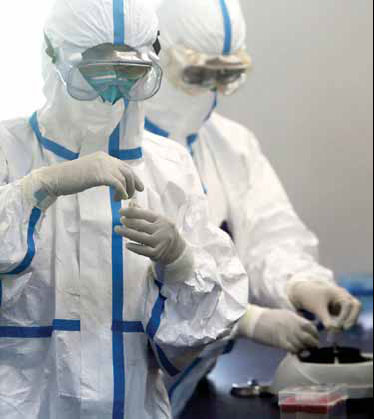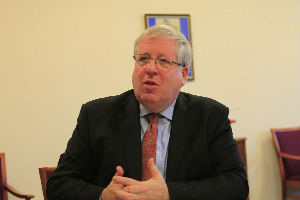Ready to go
Updated: 2013-10-25 09:56
By Alfred Romann (China Daily Europe)
|
|||||||||||
Companies will be allowed to import goods directly into the zone before going through customs, but it is service providers such as insurance companies and private hospitals that expect to see the most benefits. In theory, companies both domestic and foreign will be allowed to invest in banks, shipping, entertainment services, schools and more out of the zone.
Even if there are more than 1,000 sectors that still remain off-limits to investors, the zone is likely to help develop the service industry, particularly if the pilot is introduced nationwide.
A few days after the launch of the free trade zone, came the National Day holiday that helped the service portion of the economy grow further after reaching a six-month peak in September. As it turns out, the number of tourists during the period hit a record.
There were so many tourists that much of the feedback was negative, many complaining that the more popular sites around the country were overcrowded, hotels were full and that restaurants were operating beyond capacity.
On the positive side, the growing number of tourists suggests that Chinese people are willing and able to spend. It does not necessarily suggest a return to double-digit economic growth but it may be useful anecdotal evidence of continuing growth.
Promising data
And the latest numbers, both official and private, suggest China's service sector grew faster last month than it had in the previous six months even as growth in other areas remains slack due to weak demand at home and abroad.
The official purchasing managers' index for the non-manufacturing sector rose to 55.4 in September from 53.9 in August. It was the highest reading since March, according to the National Bureau of Statistic, which compiles the numbers with the China Federation of Logistics and Purchasing. A number above 50 represents growth.
"The index reflected strong growth in consumption services represented by retail, thanks to the holiday factor in September," says Cai Jin, vice -chairman of the China Federation of Logistics and Purchasing. "It also showed that restructuring policies had boosted demand in the service sector."
The HSBC/Markit Services PMI, which came out on Oct 8, painted a slightly different picture, coming in at 52.4 for September compared with 52.8 in August as both manufacturers and services providers raised their prices in response to higher costs.
The service sector continues to grow but the growth is increasingly subdued.
"Combined with the gradual improvement of the manufacturing PMI, the Chinese economy is still on the way to modest recovery," says Qu Hongbin, chief economist for China and co-head of Asian economic research. "But a more consolidated and sustainable recovery requires structural reforms."
More than underscoring a continuing rebound in economic activity, increasing non-manufacturing activity underscores the government's efforts to change the structure of the country's economy.
For the time being, the service sector remains mostly protected across the country. Foreign players that can invest with ease in most industrial sectors have a more difficult time investing in services such as accounting, banking or legal services. The new Shanghai free trade zone could mark the beginning of a change and the opening of the sector to international competition but details of what exactly the zone would do are sparse.
"The government is aware that they need to reform. They are losing capacity in the traditional industries," says Stuart Allsopp, head of Asia country risk and financial markets at Business Monitor International, a market intelligence firm. The free trade zone is a move in the right direction, even if details remain sketchy. For example, Allsopp says, foreigners will be able to invest in things like schools.
The current 12th Five-Year Plan (2011-15) calls for services to contribute about 47 percent of GDP by the end of 2015. That would represent a gain of about 2 percent from current levels but would cement services as the biggest single contributor to the country's GDP. Zhao of the East Asian Institute says the target is attainable. Within three to five years, he says, services could account for as much as half of the economy.
China's GDP last year was $8.227 trillion. Services accounted for just under 45 percent of that, a little less than $3.7 trillion, according to official figures.
But these measurements can be subjective. Measuring GDP can be a difficult thing and determining what is a service and what is a good requires myriad small decisions. Somebody has to make a decision about what is a service and what is a good, something that is not always clear-cut. And because avoiding double counting is key to calculating GDP, somebody has to make a decision about what to count. For example, if a tourist buys a plane ticket, is the fuel that the airline buys for that trip counted as a good, or is it only the purchase of the ticket that is counted?
Allsopp from Business Monitor International prefers to look at private consumption to track the growth of services in the economy and private consumption accounts for about 30 percent of GDP, much less than the services tab.
"We think the private consumption data is probably more accurate," Allsopp says. "The service sector is quite underdeveloped. It's not that it is not growing but, relative to the broader economy, it is slowing."
Despite the growth and the emergence of services as the largest single contributor to the country's GDP, services remain relatively underdeveloped in China, which has long focused on manufacturing as an engine of growth.
But this is changing both at home and abroad. China's overseas investments are increasingly focused on the service sector. This push matches both China's interest to invest more and more abroad but also helps countries in places like Asia and Africa develop their own service sectors.
More and more countries in Asia are likely to emphasize services, but it will be a little bit like paddling against the current, Allsopp says.
"It is not something that Asia has a comparative advantage in," Allsopp says. Nevertheless, "as economies do develop, people tend to spend more on services".
|
Doctors work at the Beijing Center for Disease Control. The service sector is gaining more importance as the country continues to urbanize. AFP |
Today's Top News
Mythbuster dispels fictions about China
Forum urges stableChina-Japan ties
NSA spying hurts US diplomacy
Carrier rocket sent to launch base for moon landing
Requirements cut for business startups
Study shows PM1 most harmful
Cold snap to sweep NE, N China
Paper apologizes for reporter's untrue stories
Hot Topics
Lunar probe , China growth forecasts, Emission rules get tougher, China seen through 'colored lens', International board,
Editor's Picks

|

|

|

|

|

|






